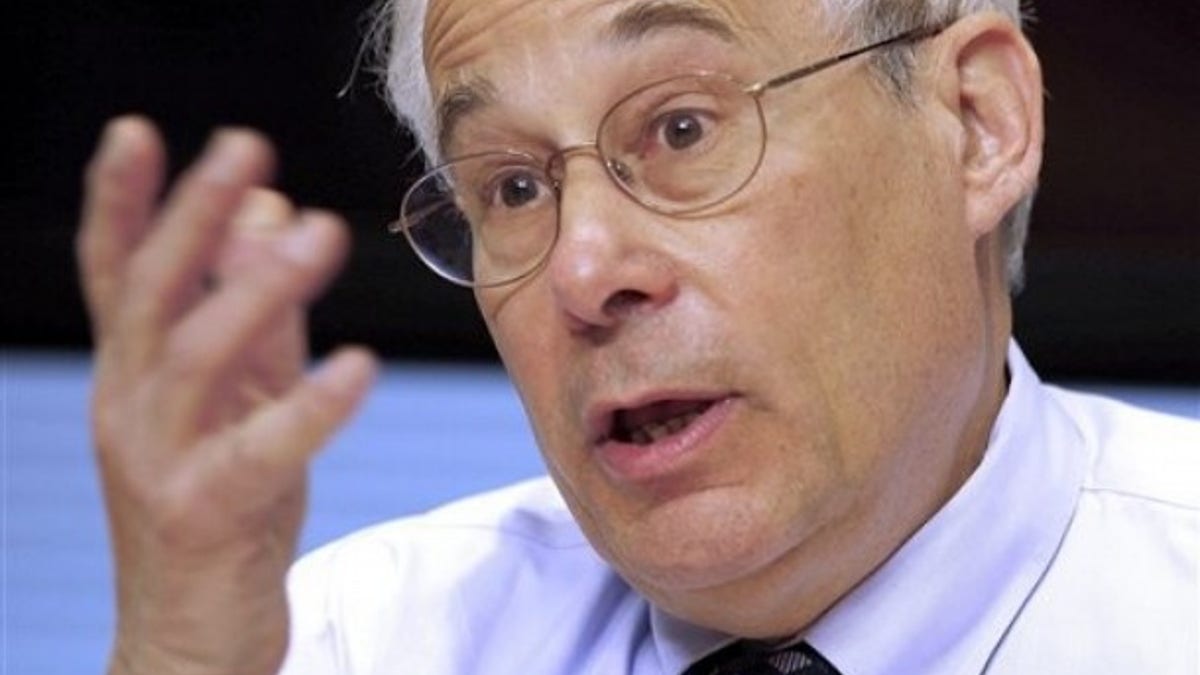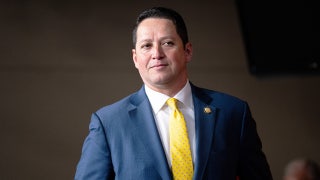
April 12, 2011: Medicare and Medicaid Administrator Donald Berwick gestures during an interview with The Associated Press in Washington. (AP)
WASHINGTON – Medicare chief Don Berwick, the point man for carrying out President Obama's health care law, announced Wednesday that he will step down on Dec. 2 in anticipation of not getting confirmation in the Senate to extend his term beyond a recess appointment.
Berwick, a Harvard professor who aggravated many Republicans for his praise of Britain's government-run health care program, was appointed as head of the Center for Medicare and Medicaid Services by President Obama on July 7, 2010.
Knowing that Berwick would not be confirmed to take a more permanent post, the recess appointment was temporary. It runs out at the end of this year.
Forty-two GOP senators -- more than enough to derail Berwick's confirmation -- had announced their opposition to his nomination months ago.
"Not only did he not win Republicans over he didn't win Democrats in the Senate over and Max Baucus, chairman of the Finance Committee, never even scheduled a hearing on the nomination," Sen. John Barrasso, R-Wyo., a physician told Fox News Radio on Wednesday.
A pediatrician before becoming an educator, Berwick had sought a public-based system that he said would provide a better overall experience for individual patients, improve the health of groups of people such as seniors and African-Americans and lower costs through efficiency.
But many of his prior statements dogged him in Washington, especially over the question of rationing. His praise for the British model also sent up flags.
"You could have been spending 17 percent of your GDP to make healthcare unaffordable as a human right, instead of spending 9 percent and guaranteeing it as a human right," he said in a 2008 speech delivered in the United Kingdom.
"You could have had a monstrous insurance industry of claims and rules and paper pushing instead of using your tax base to provide a single route of finance," he added. "Any healthcare funding plan that is just equitable civilized and humane must, must redistribute wealth from the richer among us to the poorer and less fortunate. Excellent health care is by definition redistributional. Britain you chose well."
During hearings on the Hill, Berwick distinguished U.S. needs from the British model, saying "the American system needs its own solution." He also denied supporting rationing.
"I abhor rationing. My entire life has been spent fighting rationing. There's no substance whatsoever to the substance of that," Berwick told the House Ways and Means Committee in February 2011.
He also told a Biotechnology Healthcare, an industry publication, that some health care is "so expensive that our taxpayers have better use for those funds."
"We make those decisions all the time. The decision is not whether or not we will ration care ... the decision is whether we will ration with our eyes open. And right now, we are doing it blindly," he is quoted saying.
Defenders say Berwick's only problem was that he was a surrogate for the health care law
"The reason why they decided not to go forward with Berwick was because Republicans were really determined to tear--Republicans were politically determined to tear him down and to tear down the law," said Igor Volsky, the health care policy editor for ThinkProgress.org at the Center for American Progress.
To be sure, Berwick had become too controversial to win any converts.
"As government continues to struggle to find a way to add 30 million people to the taxpayer-funded health care rolls thanks to Obamacare in the midst of a sovereign debt crisis, Senate Republicans are to be praised for blocking the confirmation of Berwick," Americans for Limited Government President Bill Wilson said Wednesday.
Berwick's "doctrines were pure Marxism," Wilson added, warning that Senate Republicans "must be vigilant that whosoever Obama selects to replace Berwick is not just another radical extremist."
Obama on Wednesday announced that he intends to nominate Berwick's principal deputy, Marilyn Tavenner, Virginia's secretary of health and human resources from 2006-2010, to be his replacement.
Former Virginia Gov. Tim Kaine, for whom Tavenner served, said the nominee played "an instrumental role" in the state on several items, most notably by helping reduce "Medicaid costs in smart ways through program improvements, focus on preventive care and creative use of technology."
For Republicans, they want to hear more.
"I'm glad the White House opted against another end run around the Senate and instead has put forward a CMS nominee that the Senate must thoroughly examine. Republicans on the Finance Committee look forward to examining her record and gaining an understanding of her views of Medicare, Medicaid and the President’s health law," said Sen. Orrin Hatch of Utah, ranking Republican member of the finance panel.
For his part, Berwick, who turned 65 this year -- making him the first Medicare chief eligible to be enrolled in the program -- told The Associated Press that he was putting in his application, but that he intends to keep working to improve the nation's health care system.
Fox News' Jim Angle and The Associated Press contributed to this report.












































